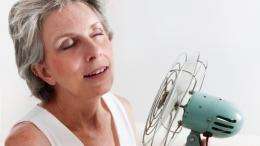Research looks at cooling off hot flashes

If you've ever watched a woman go from perfectly calm, cool and collected one minute to uncomfortable, red-faced and fanning herself frantically the next, then you've likely witnessed a hot flash. Now imagine having to experience one or dozens of these episodes a day -- from mild to severe -- with limited options for long-term relief.
"Probably 80 percent of women use nothing” to treat their hot flashes, says University of Cincinnati (UC) professor Michael Thomas, MD, the principal investigator on a Phase 2 clinical trial of a new, nonhormonal treatment for hot flashes.
The study is sponsored by Ausio, a Cincinnati-based pharmaceutical company. UC is one of two sites in the U.S. where the soy-based product is being studied.
Although there is no definitive cause for a hot flash, its origin is linked to estrogen diminishment during perimenopause, menopause and post menopause. Hormone replacement therapy (HRT) was the standard treatment until 1991, when a study suggested that estrogen therapy increased the risk of breast cancer, heart attack, blood clots and other serious conditions, says Thomas.
"These fears, whether rational or not, have driven the need to look for alternative treatments,” adds Thomas, who is also the director of UC’s Center for Reproductive Health which oversees clinical trials.
Not all women have hot flashes, but those who do can experience one or all of these symptoms:
• Pressure in the head as the hot flash begins.
• A feeling of mild warmth to intense heat spreading through the upper body and face.
• A flushed appearance with red, blotches on the face, neck and upper chest.
• Rapid heartbeat.
• Perspiration, mostly on the upper body.
• A chilled feeling as the hot flash subsides.
According to Rose Maxwell, PhD, the center’s director of clinical trials, this study is for post menopausal females who experience moderate to severe hot flashes but are not on any medication, either chemical or herbal. A moderate hot flash is one that produces perspiration. A severe hot flash produces perspiration and is incapacitating to the point of disrupting normal activities, such as sleep.
The study will compare the effectiveness and safety of three doses of the soy-based Ausio product versus a placebo (an inactive look-alike substance) for hot flashes.
Thomas is a past paid consultant to Ausio. He reports no current conflict.















